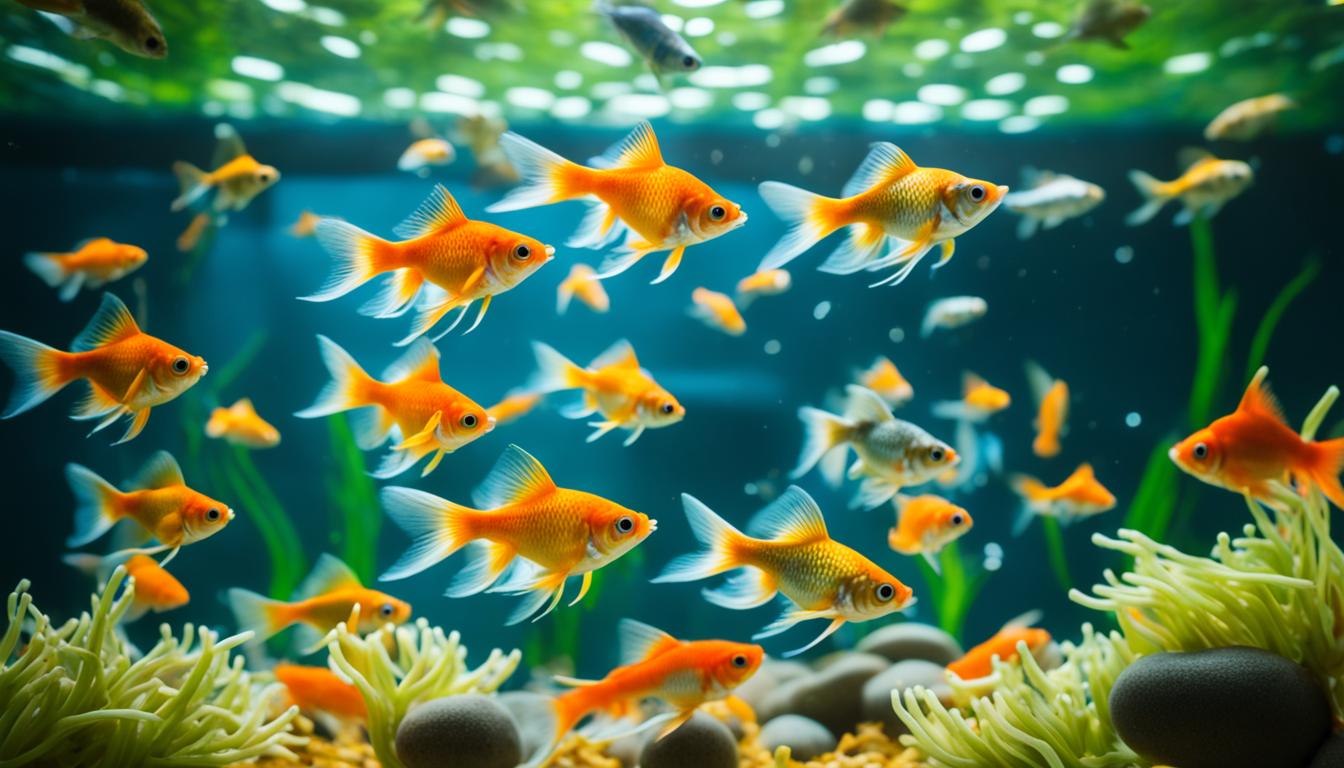Last Updated on 2 weeks by admin
Goldfish and guppies are both popular choices for aquarium fish. Many people wonder if goldfish will eat guppies and if they can coexist peacefully in the same tank. Understanding the feeding habits and predatory behavior of goldfish is key to maintaining harmony in your aquarium.
Key Takeaways:
- Goldfish and guppies have different dietary requirements. Goldfish need a more balanced diet that includes both plant and meat-based foods, while guppies require a high protein diet.
- Feeding guppy food to goldfish as an occasional treat is unlikely to cause harm, but making it their regular diet can lead to nutritional imbalances and potential health issues.
- While it is technically possible to keep guppies and goldfish in the same tank, it is not recommended due to the risk of fin nipping and potential predation.
- Understanding the dietary needs of goldfish and guppies is crucial to ensuring their optimal health and well-being in an aquarium.
- Keeping guppies and goldfish separate allows each species to thrive in an environment that caters specifically to their dietary requirements.
What’s in a Fish Food?
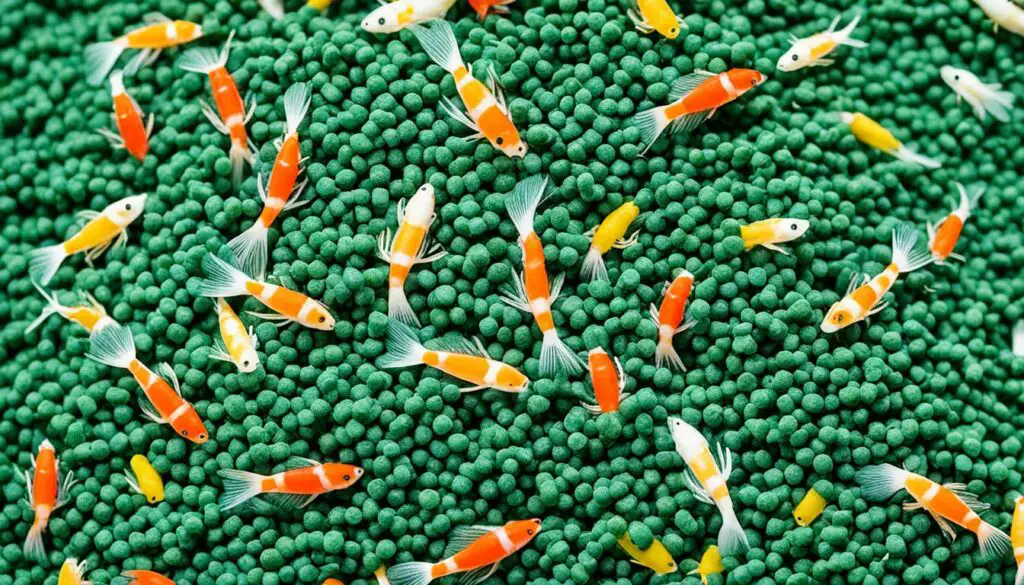
Fish food plays a crucial role in meeting the specific nutritional needs of different fish species. It is composed of a variety of ingredients that provide the essential proteins, fats, vitamins, and minerals necessary for the health and well-being of your aquatic pets. Understanding the composition of fish food is essential for ensuring that your fish receive a balanced diet that supports their optimal growth and development.
Proteins: Proteins are a vital component of fish food as they contribute to the growth and repair of tissues and help support a healthy immune system. They are typically derived from animal sources such as fish meal, shrimp meal, or krill. These protein-rich ingredients provide the necessary amino acids that fish require to thrive.
Fats: Fats are an important source of energy for fish and also aid in the absorption of fat-soluble vitamins. Fish food often contains fish oils or vegetable oils as a source of essential fatty acids, such as omega-3 and omega-6, which promote healthy skin, scales, and overall vitality.
Vitamins: Vitamins are crucial for maintaining the overall health and metabolism of fish. Fish food is fortified with a range of vitamins, including vitamin A, vitamin C, vitamin D, and various B vitamins. These vitamins help support immune function, promote growth, and enhance the overall well-being of your fish.
Minerals: Minerals such as calcium, phosphorus, and iron are necessary for maintaining strong bones, teeth, and proper physiological functions in fish. Fish food is formulated to provide a balanced ratio of these minerals to meet the specific dietary requirements of different fish species.
It is important to note that fish food ingredients and their ratios may vary depending on the specific nutritional needs of different fish species. For example, guppy food is formulated to meet the high protein needs of guppies, while goldfish food is designed to provide a balanced diet that includes both plant and meat-based ingredients.
Can Goldfish Eat Guppy Food?
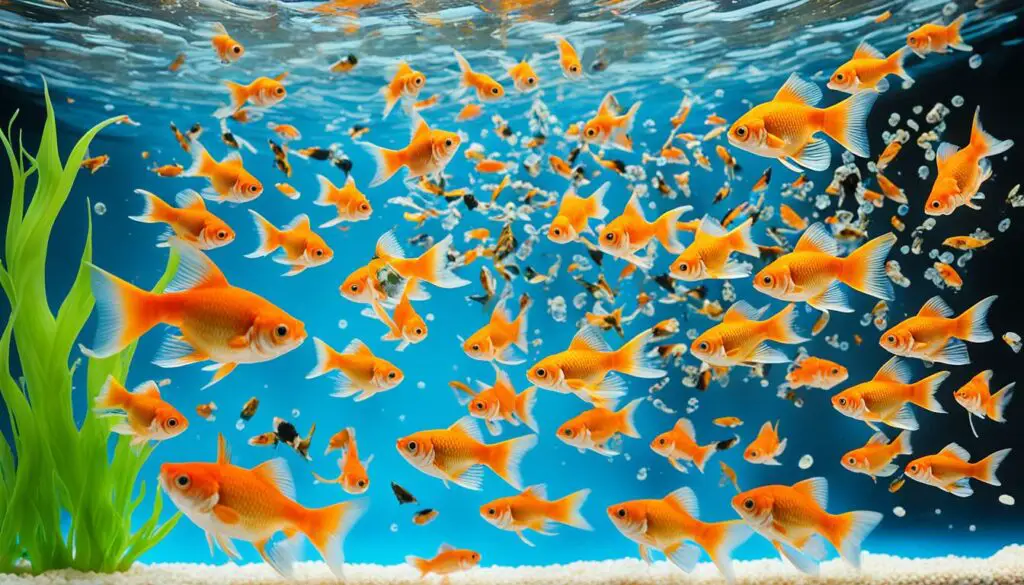
When it comes to feeding your goldfish, it’s important to provide them with a diet that meets their nutritional requirements. While it is possible for goldfish to eat guppy food, it is not advisable to make it their primary diet. Goldfish have different dietary needs compared to guppies, and feeding them a diet primarily consisting of guppy food can lead to nutritional imbalances and potential health issues.
Guppy food is specifically formulated to cater to the high protein needs of guppies due to their fast metabolism. On the other hand, goldfish require a more balanced diet that includes both plant and meat-based foods. This ensures they receive the necessary nutrients for optimal health and growth.
Occasional consumption of guppy food by goldfish is unlikely to cause harm. However, making it their regular diet can result in deficiencies or an excess of certain nutrients, which can negatively impact their health over time.
Key Points:
- Goldfish can eat guppy food, but it is not recommended to make it their primary diet.
- Guppy food is formulated for the high protein needs of guppies, while goldfish require a more balanced diet.
- Feeding goldfish guppy food as a regular diet can lead to nutritional imbalances and potential health issues.
- Occasional consumption of guppy food is unlikely to harm goldfish.
It’s important to prioritize the specific dietary needs of your goldfish to ensure their optimal health and well-being. Providing them with a well-rounded diet that includes specially formulated goldfish food will keep them thriving in your aquarium.
The Goldfish Diet
Goldfish are omnivores and have a diverse diet that includes both plants and meat. In their natural environment, goldfish would consume algae, small crustaceans, and even tiny insects. These varied food sources provide the necessary nutrients for their health and well-being.
When it comes to pet goldfish, their diet often consists of specially formulated pellets or flakes that provide a balanced mix of nutrients. These commercial foods are designed to meet the dietary needs of goldfish and help them thrive in a controlled aquarium environment. The pellets and flakes typically contain a combination of proteins, fats, vitamins, and minerals.
Understanding the dietary needs of goldfish is crucial for their overall health and longevity. Providing a proper diet ensures that goldfish receive the essential nutrients they require to maintain vibrant colors, strong immune systems, and healthy growth.
Goldfish have specific dietary needs that should be considered when feeding them:
- Proteins: Goldfish require a good amount of protein in their diet for energy and growth. The protein can come from both plant and animal sources.
- Plant Matter: Goldfish also need a significant amount of plant matter in their diet. This can be in the form of vegetables, algae, or other aquatic plants. Plant matter provides fiber and essential vitamins.
- Carbohydrates: While goldfish do not require high levels of carbohydrates, they can benefit from small amounts to provide energy.
- Fats: Fats are an important component of a goldfish’s diet and help support their overall health. A diet that includes both plant-based and animal-based fats is ideal.
- Vitamins and Minerals: Goldfish require a variety of vitamins and minerals for proper growth and development. These nutrients can be found in their commercial food as well as additional supplements or fresh foods.
In addition to commercial food, goldfish can also enjoy treats like bloodworms, brine shrimp, and chopped vegetables. These treats can be given occasionally to provide variety and enrichment to their diet.
It’s important to note that overfeeding goldfish can lead to health problems like obesity, swim bladder issues, and water quality problems. It’s best to follow the recommended feeding guidelines and monitor your goldfish’s body condition to ensure they are getting the right amount of food.
In summary, understanding the natural diet of goldfish and providing them with a balanced diet is essential for their well-being. A combination of specially formulated commercial food, plant matter, and occasional treats will help meet their dietary needs and promote their overall health.
Guppy Food Nutritional Breakdown
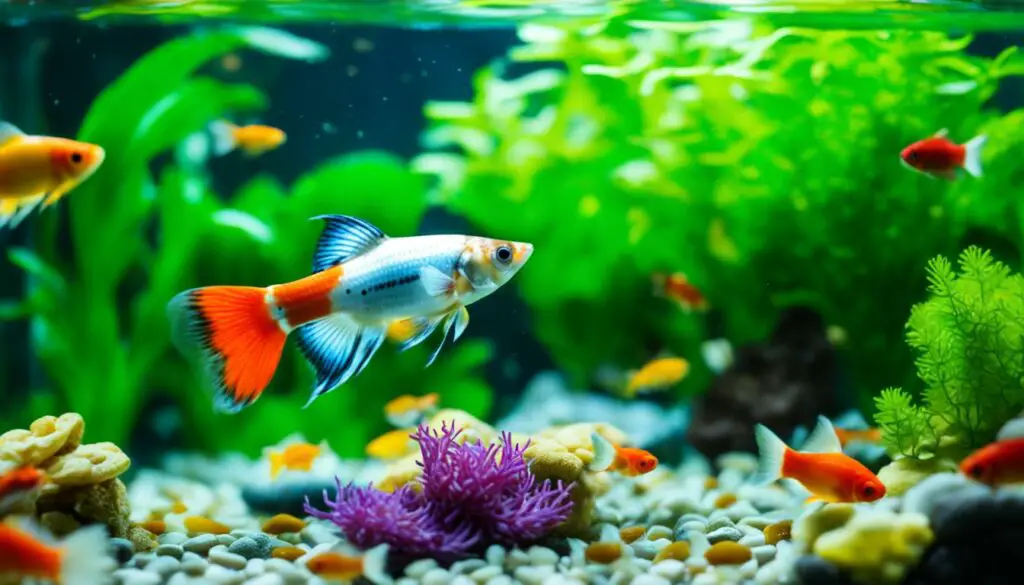
Guppies, being small freshwater fish, have specific nutritional needs that are crucial for their health and well-being. Their fast metabolism requires a diet that is high in protein. Guppy food is specially formulated to meet these dietary requirements and provide a balanced mix of proteins, fats, and carbohydrates, with a greater emphasis on protein content.
By ensuring that guppies receive the proper nutrients, fish owners can promote vibrant colors, healthy growth, and overall vitality in their guppies. Let’s take a closer look at the nutritional composition of guppy food:
| Nutrient | Percentage/Quantity |
|---|---|
| Proteins | Approximately 40-50% |
| Fats | Around 10-15% |
| Carbohydrates | About 35-45% |
| Vitamins and Minerals | Varies based on brand and formulation |
Guppy food typically consists of high-quality protein sources, such as fish meal or shrimp meal, which provide the essential amino acids required for growth and development. The inclusion of fats helps provide energy, while carbohydrates contribute to overall dietary balance.
Why is Protein Important for Guppies?
Proteins play a vital role in the growth and development of guppies. They provide the necessary building blocks for muscle development, tissue repair, and the production of enzymes and hormones. Protein is particularly crucial for juvenile guppies as they are rapidly growing and require a higher percentage of protein in their diet compared to mature adults.
Additionally, the protein content in guppy food helps support vibrant colors in these fish. Certain pigments responsible for the beautiful hues seen in guppies require adequate protein intake to be synthesized effectively. By providing a diet rich in protein, guppy owners can enhance the coloration and beauty of their fish.
Proper nutrition plays a key role in the health and vibrancy of guppies. Providing a diet that meets their nutritional needs is essential for their growth, coloration, and overall well-being.
Guppy food manufacturers understand the specific requirements of these fish and formulate their products to ensure optimal nutrition. However, fish owners should still consider factors such as the quality and ingredients of the food when making a selection.
In the next section, we will explore the risks involved in feeding guppy food to goldfish and the potential health issues that may arise. Stay tuned!
Risks Involved
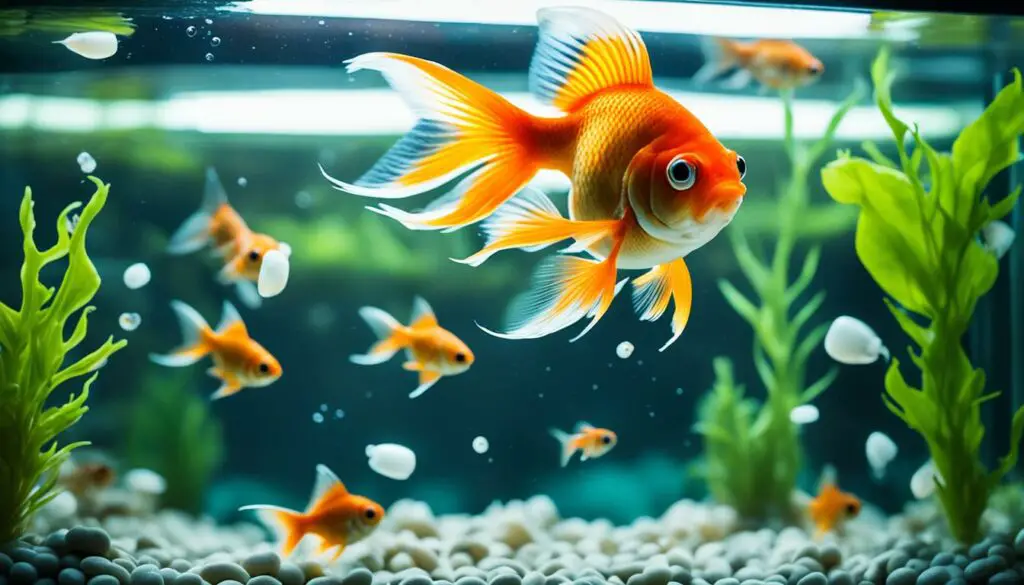
Consistently feeding guppy food to goldfish can pose several risks and potential health issues. Goldfish have distinct nutritional requirements that differ from those of guppies. A diet primarily consisting of guppy food can lead to nutritional imbalances, digestive problems, and potentially stunted growth or other health complications over time.
Goldfish thrive when provided with a diet specifically tailored to their needs. While occasional consumption of guppy food may not cause immediate harm, it is essential to prioritize a balanced diet that fulfills the nutritional requirements of goldfish for their optimal health and well-being.
Feeding goldfish guppy food on a regular basis can result in insufficient intake of essential nutrients, such as proper proteins and specific vitamins and minerals. This imbalance can disrupt the goldfish’s digestive system, leading to issues like indigestion, bloating, constipation, and even swim bladder problems.
Moreover, goldfish require a diet that includes both plant-based and meat-based foods to maintain their overall health. Guppy food, on the other hand, is primarily formulated to meet the high protein requirements of guppies.
Potential Health Issues
Feeding goldfish an improper diet consisting predominantly of guppy food can have several detrimental effects on their health:
- Stunted Growth: Goldfish may not reach their full potential size and develop stunted growth if they do not receive the essential nutrients required for their growth and development.
- Weak Immune System: A diet lacking in essential nutrients weakens the goldfish’s immune system, making them more susceptible to diseases and infections.
- Organ Malfunction: Nutritional imbalances can lead to organ dysfunction and affect the overall well-being of the goldfish.
- Dull Coloration: Goldfish may lose their vibrant colors and appear pale if their diet lacks the necessary nutrients for color enhancement.
It is crucial to provide goldfish with a well-rounded diet to ensure they lead a healthy and fulfilling life. To maintain their optimal health, offer them a variety of high-quality goldfish pellets, flakes, and vegetables suitable for their dietary needs.
| Risks of Feeding Guppy Food to Goldfish | Potential Health Issues |
|---|---|
| Nutritional imbalances | Stunted Growth |
| Digestive issues | Weak Immune System |
| Swim bladder problems | Organ Malfunction |
| Inadequate essential nutrients | Dull Coloration |
Feeding goldfish a balanced diet ensures their overall well-being, longevity, and enhances their natural vibrancy, vitality, and beauty.
Are There Any Benefits?
While it is not recommended to make guppy food a regular part of a goldfish’s diet, there can be some benefits to occasional consumption. Guppy food contains essential nutrients that won’t harm goldfish, and as an occasional treat, it can provide a variety of proteins and fats.
Goldfish, although primarily herbivores, can benefit from the occasional inclusion of protein-rich foods in their diet. Guppy food offers a variety of proteins and fats that can supplement their nutritional requirements. This occasional treat can help diversify their diet and provide a source of essential nutrients.
| Benefits of Occasional Guppy Food Treat for Goldfish |
|---|
| 1. Source of additional proteins and fats |
| 2. Adds variety to the diet |
| 3. Helps satisfy the natural omnivorous tendencies of goldfish |
However, it is important to prioritize a diet that specifically meets the nutritional needs of goldfish for long-term health and well-being. Regularly feeding goldfish with guppy food can lead to imbalances in their diet and potential health issues over time.
By offering guppy food as an occasional treat, you can provide some additional nutrients and satisfy their natural omnivorous tendencies. Just remember to monitor their overall diet and ensure it is well-balanced to support their specific dietary requirements.
Can Guppies and Goldfish Be Tank Mates?
While it is technically possible to keep guppies and goldfish in the same tank, it is not recommended. Guppies and goldfish have different dietary requirements, and there is a risk of fin nipping and potential predation. Guppies have small fins that are attractive to goldfish and can be nipped, causing stress and potential injury. Additionally, as goldfish grow larger, they may attempt to eat smaller guppies. It is best to keep guppies and goldfish separate to maintain the health and well-being of both fish.
Goldfish and guppies are both popular choices for aquarium fish. While some fish enthusiasts may be tempted to keep them together, it is essential to consider the compatibility of their dietary needs and potential risks.
Guppies, with their vibrant colors and active nature, are known for their small and delicate fins. These fins can be highly attractive to goldfish, which may attempt to nip at them. Fin nipping can cause stress and lead to potential injuries for guppies.
Additionally, goldfish have different dietary requirements compared to guppies. Guppies thrive on a high protein diet due to their fast metabolism, while goldfish need a more balanced diet that includes plant and meat-based foods. Feeding guppy food to goldfish regularly can result in nutritional imbalances and health issues.
As goldfish grow larger, they may view smaller guppies as potential prey. This predatory behavior can pose a serious risk to the safety and well-being of the guppies.
To ensure the optimal health and harmony of your aquarium, it is best to keep guppies and goldfish in separate tanks. This way, you can cater to their specific dietary needs and prevent any potential fin nipping or predatory behavior.
Conclusion
In conclusion, it is important to prioritize a diet that specifically caters to the nutritional requirements of goldfish and guppies when maintaining a harmonious aquarium environment. While goldfish can eat guppy food and both fish share some similarities in their dietary needs, it is best to avoid making guppy food a regular part of a goldfish’s diet. Feeding guppy food to goldfish as an occasional treat is unlikely to cause harm, but relying on it as their primary diet can lead to imbalances and potential health issues.
To maintain the health and well-being of both goldfish and guppies, it is recommended to keep them separate to avoid risks such as fin nipping and predation. Goldfish have different nutritional requirements and may attempt to nip the small fins of guppies, causing stress and potential injury. Additionally, as goldfish grow larger, they may view smaller guppies as prey.
By understanding the specific dietary needs of goldfish and guppies, you can ensure the optimal health and well-being of your fish. Providing a balanced and tailored diet for each species will help create a harmonious aquarium environment where both fish can thrive. Remember to always prioritize the nutritional requirements of your fish when selecting their food and maintaining their tank.
FAQ
Will goldfish eat guppies?
Goldfish have a predatory nature and may eat smaller fish like guppies, especially as they grow bigger. It is not recommended to keep goldfish and guppies together in the same tank.
What’s in a fish food?
Fish food typically contains proteins, fats, vitamins, and minerals that meet the specific dietary requirements of different fish species. The ingredients and balance of nutrients vary based on the target fish species.
Can goldfish eat guppy food?
While goldfish can eat guppy food, it is not recommended to make it their primary diet. Goldfish have different nutritional requirements compared to guppies, and a diet primarily consisting of guppy food can result in imbalances and potential health issues.
What is the goldfish diet?
Goldfish are omnivores and eat a range of foods, including plants and meat. They require a balanced diet that includes both plant and meat-based foods to ensure their optimal health and well-being.
What is the nutritional breakdown of guppy food?
Guppy food is designed to provide a high protein diet for guppies due to their fast metabolism. It contains a good balance of proteins, fats, and carbohydrates, with a higher emphasis on protein.
What are the risks involved in feeding guppy food to goldfish?
Feeding guppy food to goldfish on a regular basis can lead to nutritional imbalances, digestive issues, and potential stunted growth or other health problems over time. Goldfish have different dietary needs than guppies and require a diet specifically catered to their requirements.
Are there any benefits to feeding guppy food to goldfish?
While occasional consumption of guppy food by goldfish as a treat is unlikely to cause harm, it can provide a variety of proteins and fats. However, it is best to prioritize a diet that specifically meets the nutritional needs of goldfish for long-term health and well-being.
Can guppies and goldfish be kept together in the same tank?
While it is technically possible to keep guppies and goldfish in the same tank, it is not recommended. Guppies and goldfish have different dietary requirements, and there is a risk of fin nipping and potential predation, where goldfish may attempt to eat smaller guppies.
Can goldfish and guppies coexist peacefully in the same tank?
It is not recommended to keep goldfish and guppies together in the same tank due to their different dietary requirements and the risk of fin nipping and predation. It is best to keep them separate to maintain the health and well-being of both fish.
Source Links
- https://thegoldfishtank.com/goldfish-food/can-goldfish-eat-guppy-food/
- https://thegoldfishtank.com/goldfish-care/tank-mates/guppies-and-goldfish/
- https://aquashinegoldfish.com/goldfish/can-guppies-eat-goldfish-food

